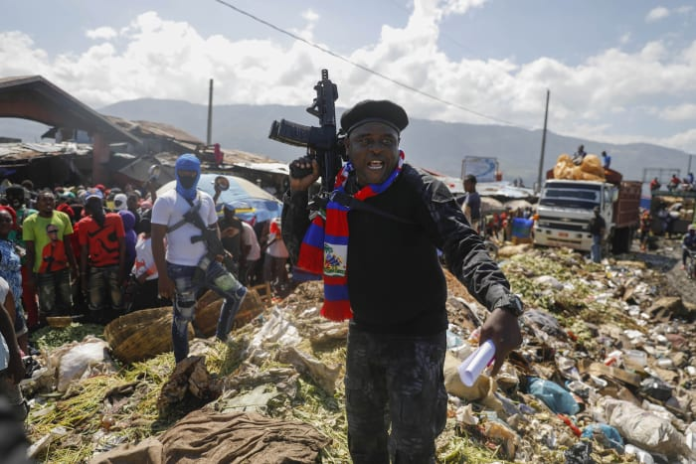FILE – Barbecue, the leader of the “G9 and Family” gang, stands next to garbage to call attention to the conditions people live in as he leads a march against kidnapping through La Saline neighborhood in Port-au-Prince, Haiti, Friday, Oct. 22, 2021. Haiti Prime Minister Ariel Henry and 18 top-ranking officials have requested on the second week of Oct. 2022, the immediate deployment of foreign armed troops as gangs and protesters paralyze the country. (AP Photo/Odelyn Joseph, File)
TANZANIA – The U.N. Security Council is negotiating a resolution that would impose an arms embargo, asset freeze and travel ban on influential Haitian gang leader Jimmy Cherizier, nicknamed “Barbeque.”
It also would target other Haitian individuals and groups who engage in actions that threaten the peace, security or stability of the Western Hemisphere’s poorest country, according to the text obtained Thursday by The Associated Press.
The U.S.-drafted resolution singles out by name Cherizier, a former police officer who leads an alliance of Haitian gangs known as the “G9 Family and Allies.” But it would establish a Security Council committee to designate other Haitians and groups to be put on a blacklist and subjected to sanctions as well.
The draft resolution expresses “grave concern about the extremely high levels of gang violence and other criminal activities, including kidnappings, trafficking in persons and the smuggling of migrants, and homicides, and sexual and gender-based violence including rape and sexual slavery, as well as ongoing impunity for perpetrators, corruption and recruitment of children by gangs and the implications of Haiti’s situation for the region.”
The Security Council moved up a meeting on Haiti to Monday because of the increasingly dire situation in the country.
Daily life in Haiti began to spin out of control last month just hours after Prime Minister Ariel Henry said fuel subsidies would be eliminated, causing prices to double. Gangs blocked the entrance to the Varreux fuel terminal, leading to a severe shortage of fuel at a time that clean water is also scarce and the country is trying to deal with a deadly cholera outbreak.
The draft resolution says “Cherizier and his G9 gang confederation are actively blocking the free movement of fuel from the Varreux fuel terminal — the largest in Haiti.”
“His actions have directly contributed to the economic paralysis and humanitarian crisis in Haiti,” it says.
In a video posted on Facebook last week, Cherizier called on the government to grant him and G9 members amnesty and to void all arrest warrants against them. He said in Creole that Haiti’s economic and social situation is worsening by the day, so “there is no better time than today to dismantle the system.”
He outlined a transitional plan for restoring order in Haiti. It would include creation of a Council of Sages with one representative from each of Haiti’s 10 departments to govern the country with an interim president until a presidential election could be held in February 2024. It also calls for restructuring Haiti’s National Police and strengthening the army.
“The country is (facing) one crisis after another,” Cherizier said. “During all these crises, the first victim is the population, the people in the ghettos, the peasants.”
Haiti has been in the grips of an inflationary vise that is squeezing its people and exacerbating protests that have brought society to the breaking point. Violence is raging, making parents afraid to send their kids to school. Hospitals, banks and grocery stores are struggling to stay open.
The president of neighboring Dominican Republic, which shares the Caribbean island of Hispaniola, recently described the situation as a “low-intensity civil war.” His government is cracking down on Haitians migrating to the Dominican Republic.
Political instability has simmered ever since last year’s still-unsolved assassination of Haitian President Jovenel Moïse, who had faced opposition protests calling for his resignation over corruption charges and claims that his five-year term had ended. Moïse dissolved Parliament in January 2020 after legislators failed to hold elections in 2019 amid political gridlock.
Last week, Haiti’s prime minister and 18 high-ranking officials requested “the immediate deployment of a specialized armed force, in sufficient quantity” by international partners to stop the “criminal actions” of armed gangs across the country.
U.N. Secretary-General Antonio Guterres sent a letter to the Security Council on Sunday calling for the deployment of a rapid action force by one or several U.N. member states to help Haiti’s National Police.
That force would “remove the threat posed by armed gangs and provide immediate protection to critical infrastructure and services,” as well as secure the “free movement of water, fuel, food and medical supplies from main ports and airports to communities and health care facilities,” he said.
The draft resolution takes note of Guterres’ letter, welcomes the appeal from Haiti, and encourages “the immediate deployment of a multinational rapid action force” to support the Haitian National Police, as the secretary-general recommends.
U.S. officials said Wednesday the Biden administration will provide security and humanitarian assistance to Haiti and pull visas to current and former government officials involved with gangs.
___
Associated Press writer Danica Coto in San Juan, Puerto Rico, contributed to this report.




